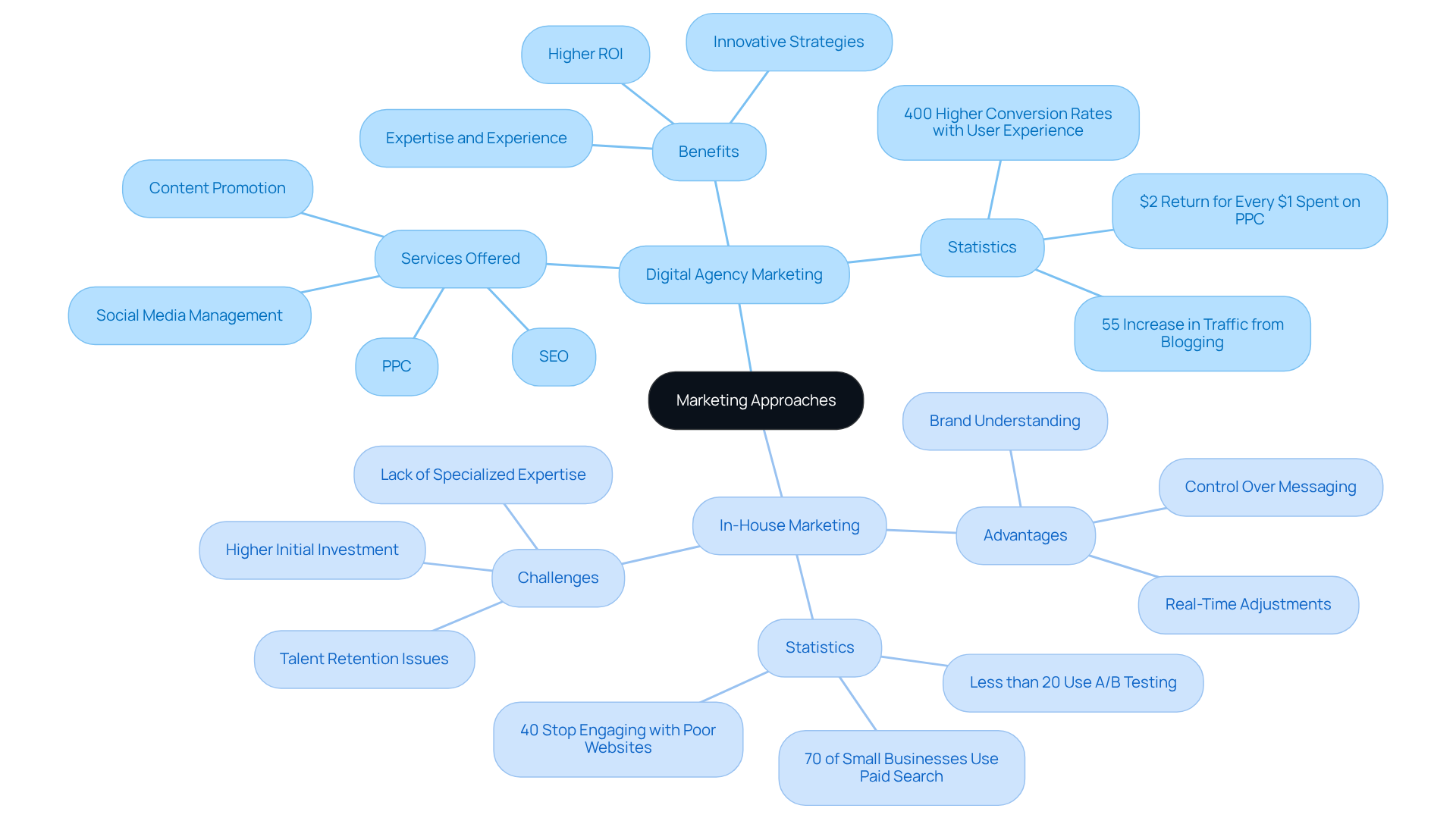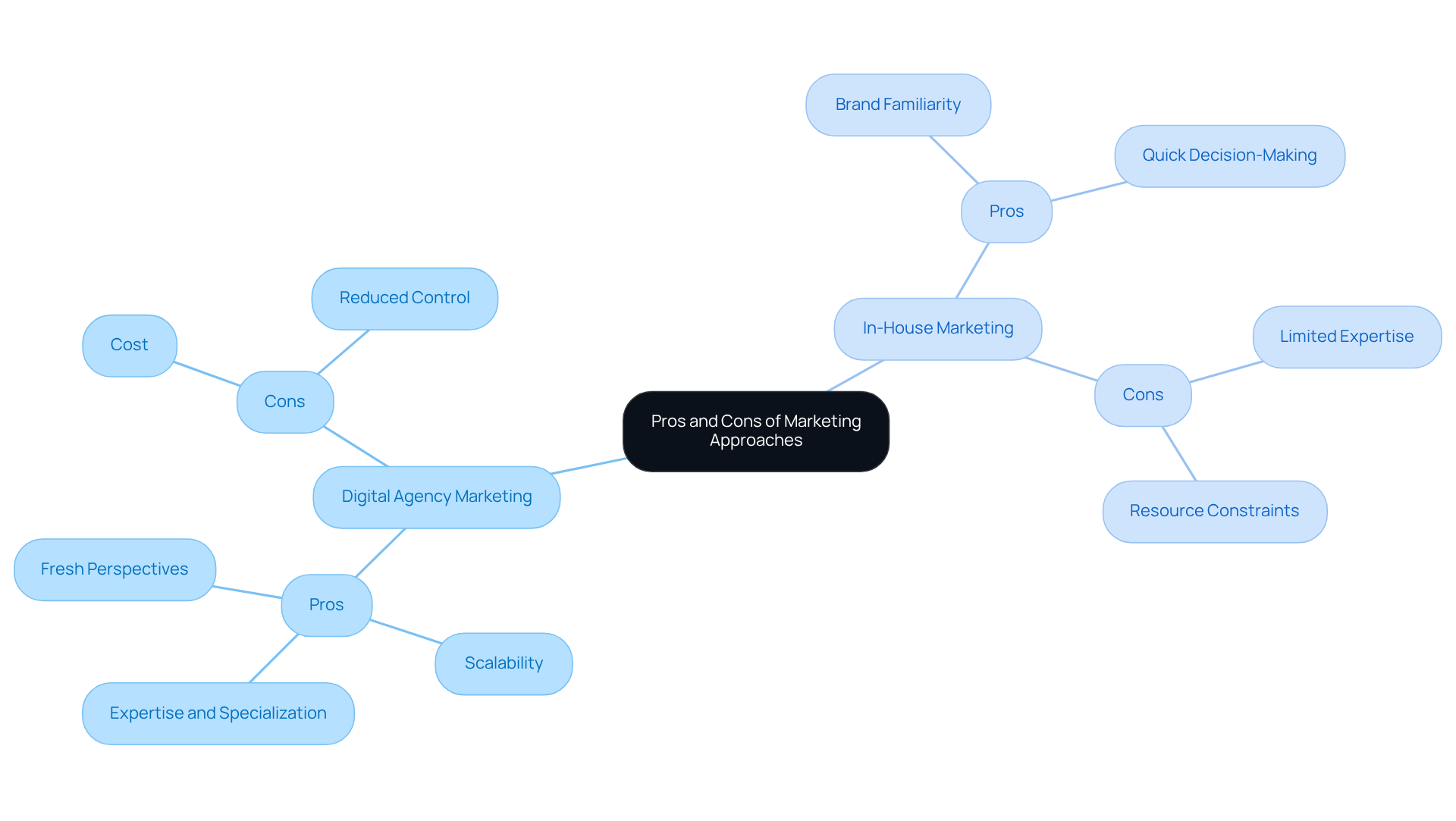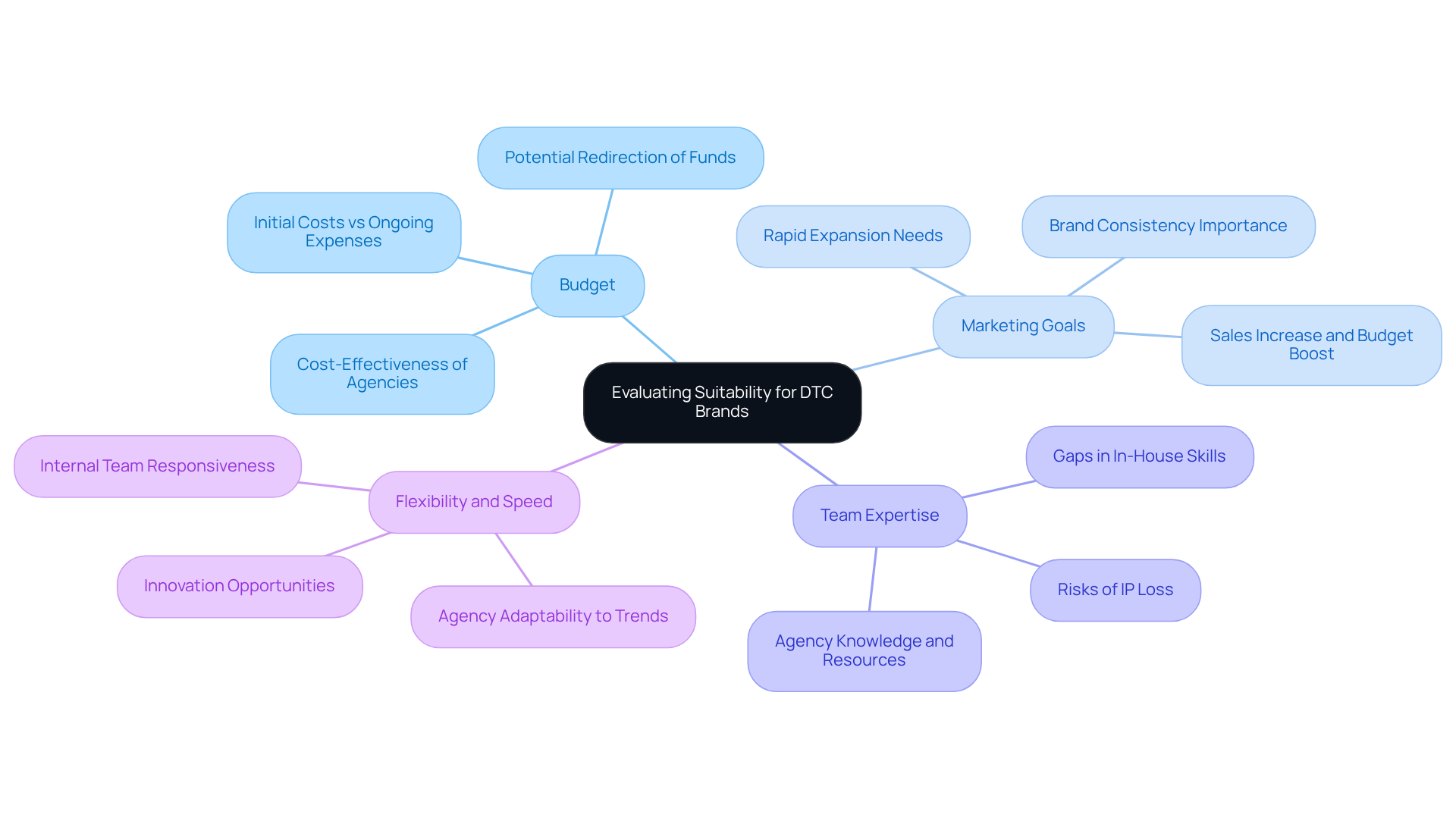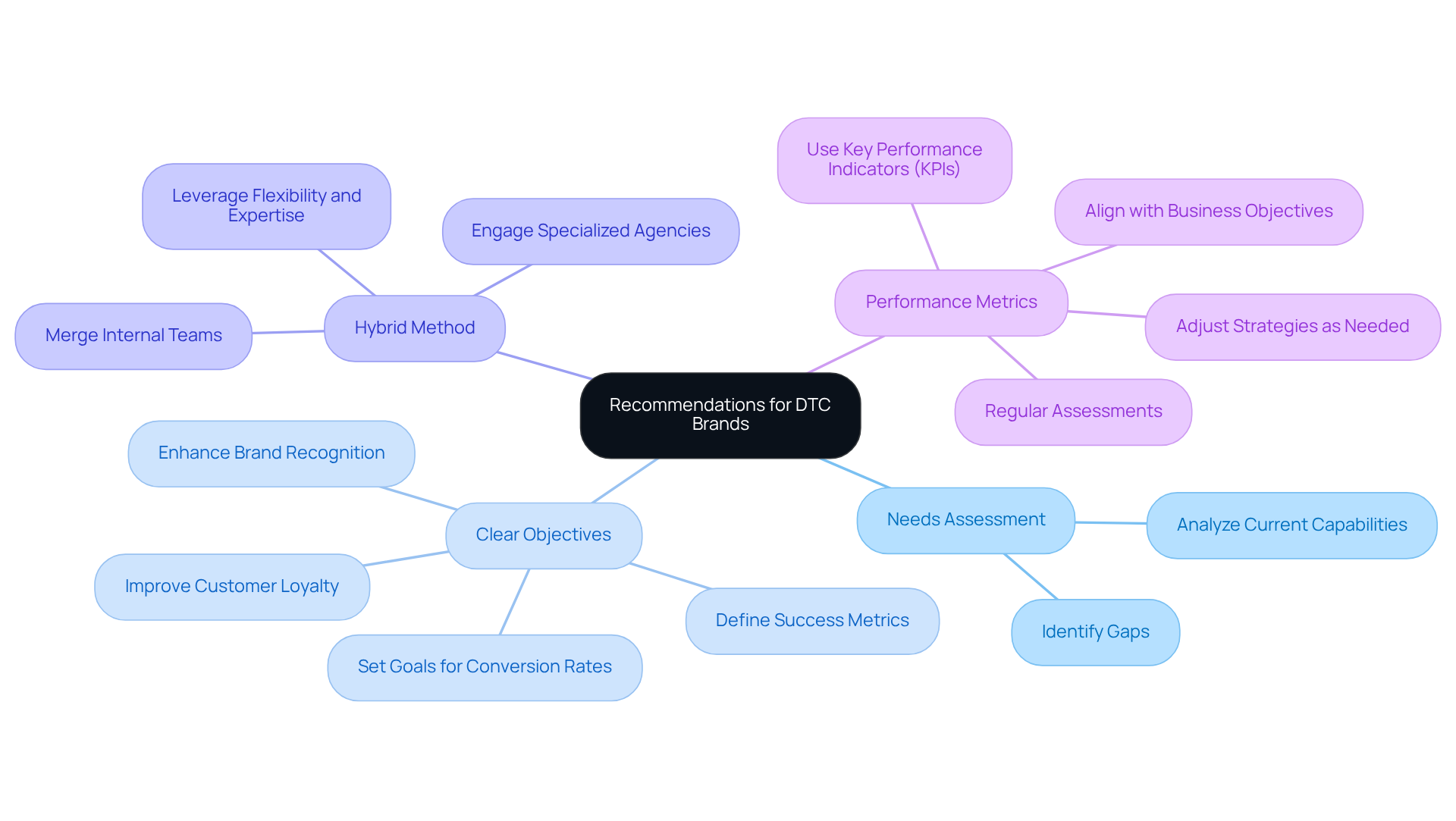
Overview
This article provides a comprehensive comparison of digital agency marketing versus in-house marketing for direct-to-consumer (DTC) brands, elucidating their respective advantages and disadvantages.
- Digital agencies are recognized for their specialized expertise and scalability, which can significantly amplify marketing efforts.
- Conversely, in-house teams excel in brand familiarity and facilitate swift decision-making processes.
Ultimately, the choice between these two approaches hinges on a company's specific goals, budgetary constraints, and resource availability. Understanding these dynamics is crucial for DTC brands aiming to optimize their marketing strategies.
Introduction
The landscape of marketing for direct-to-consumer (DTC) brands is undergoing a significant transformation, necessitating a pivotal decision: should brands leverage the expertise of digital agencies, or should they cultivate an in-house team? Each approach presents unique advantages and challenges that can profoundly influence a brand's ability to effectively reach its audience and drive growth.
As brands navigate this critical decision, they must confront essential questions regarding:
- Control
- Cost
- The depth of expertise required to excel in an increasingly competitive market.
Ultimately, which strategy will yield the most favorable returns for DTC brands aiming to enhance their market presence and foster engagement?
Understanding Digital Agency Marketing and In-House Marketing
involves entrusting promotional efforts to , including SEO, PPC, content promotion, and social media management. These organizations bring a wealth of experience and a variety of skill sets, allowing them to implement innovative strategies tailored to different sectors. For instance, companies that engage in blogging can witness a remarkable 55% increase in website traffic, underscoring the effectiveness of content strategies where agencies often excel. Additionally, websites that prioritize exceptional achieve a staggering 400% higher , highlighting the critical role of user experience in digital strategies.
Conversely, denotes a company's internal team managing its promotional activities. This method cultivates a profound understanding of the brand and enables swift adjustments based on real-time data and feedback. Nevertheless, in-house teams may lack the extensive expertise that digital agency marketing provides, particularly in specialized areas. While 70% of small businesses implement a paid search strategy, fewer than 20% utilize to optimize conversion rates, revealing a .
The choice between these two approaches often hinges on a company's specific needs and resources. In-house promotion can yield greater control over messaging and alignment with company values, whereas digital agency marketing can provide . As highlighted by industry specialists, including Samrat Sharma, can unlock new levels of efficiency and creativity, making it an appealing option for many DTC brands aiming to enhance their market presence. Furthermore, PPC campaigns generate $2 for every $1 invested, demonstrating the effectiveness of outsourcing promotional efforts.

Pros and Cons of Digital Agency Marketing vs. In-House Marketing
Pros of :
- : Digital marketing agencies frequently employ specialists across various fields, ensuring high-quality execution of marketing strategies. For instance, Streamline achieved an impressive 284.4% revenue increase in just nine months following collaboration with a specialized digital agency marketing firm.
- Scalability: Digital agency marketing enables agencies to swiftly adjust efforts based on campaign needs, providing the flexibility that is crucial for DTC brands facing fluctuating market demands.
- : Digital agency marketing can offer innovative concepts and strategies that internal teams might overlook, fostering creativity and new approaches to promotional challenges.
Cons of Digital Agency Marketing:
- Cost: Engaging an agency can be more expensive than maintaining an in-house team, particularly for long-term projects. Advertising firms typically bill between $75 and $200 per hour, and most promotional managers require a team of marketers, which can escalate costs by an additional $2,000 to over $100,000 annually.
- : Companies may experience diminished oversight of marketing activities, potentially leading to misalignment with corporate values and messaging. This concern is particularly relevant for organizations that prioritize identity consistency. Furthermore, there is a risk of cultural disconnect when collaborating with agencies that may not align with a company's culture.
Pros of In-House Marketing:
- Brand Familiarity: In-house teams possess a profound understanding of the brand's mission, values, and customer base, enabling the development of more tailored marketing strategies that resonate with the target audience.
- : Proximity to other departments fosters quicker communication and execution of plans, allowing companies to respond promptly to market shifts.
Cons of In-House Marketing:
- : In-house teams may lack specialized skills in certain areas, which can impede the effectiveness of marketing strategies. This is particularly pertinent for DTC companies that require advanced digital promotion techniques.
- Resource Constraints: Hiring and training staff can be time-consuming and costly, especially for smaller teams. This limitation can hinder the ability to implement extensive promotional strategies effectively.
Ultimately, the decision between and internal marketing hinges on a company's specific objectives, budget, and preferred level of involvement in marketing efforts. The success stories of companies like Physicians Thrive, which boosted leads by 790% in less than three years, illustrate that leveraging expert knowledge can yield substantial returns on investment. Moreover, organizations can achieve quicker ROI due to established systems, positioning them as an appealing choice for companies pursuing growth.

Evaluating Suitability for DTC Brands: Key Considerations
When evaluating the suitability of versus in-house marketing, must consider several key factors:
- Budget: Understanding the is crucial. Organizations may encounter higher initial costs, yet related to salaries, benefits, and training. For many brands, allocating over $450,000 annually for a four-member internal team might not represent the most effective use of resources, especially when firms can provide specialized expertise at a lower total expense. Moreover, funds dedicated to an in-house team could be redirected toward product development, , or investing in technology, potentially yielding greater returns.
- : Clearly defining marketing objectives is essential. If are priorities, collaborating with a digital agency marketing may prove to be more beneficial. Conversely, if and acquiring deep customer insights are critical, an internal team might be preferable. Brands aiming to increase sales and boost advertising budgets often find that digital agency marketing partnerships are advantageous, as these organizations can swiftly adapt to market needs and deliver creative solutions.
- Team Expertise: Assessing the existing skills within the in-house team is vital. —particularly in areas such as paid media, SEO, or AI-driven marketing—can be effectively filled by digital agency marketing. Additionally, in-house teams face risks such as the loss of intellectual property when employees depart, leaving businesses vulnerable. Agencies specializing in digital agency marketing offer a wealth of knowledge and resources that can enhance overall promotional effectiveness while mitigating these risks.
- Flexibility and Speed: Consider how swiftly marketing strategies need to adapt to market changes. Internal teams may respond more rapidly to urgent requirements due to their close connection with the organization. However, agencies can adjust based on broader market trends and insights gained from working with diverse clients, ensuring that campaigns remain competitive and aligned with industry best practices. The lack of urgency within internal teams can lead to stagnation and missed opportunities for innovation, making partnerships with external firms an attractive option for companies striving to maintain a competitive edge.

Making the Right Choice: Recommendations for DTC Brands
To navigate the choice between and effectively, must consider several key recommendations:
- Conduct a Needs Assessment: Analyzing current marketing capabilities and identifying gaps is crucial. This evaluation helps companies recognize their strengths and weaknesses, enabling informed decisions about resource distribution.
- Set Clear Objectives: Defining success for promotional efforts is essential. Whether the goal is to , elevate brand recognition, or enhance customer loyalty, having clear objectives directs the overall plan and implementation.
- Consider a Hybrid Method: Many successful DTC companies are discovering that a yields the best outcomes. By merging internal teams for consistency with specialized agencies for targeted projects, companies can leverage the strengths of both approaches. This strategy allows for flexibility and expertise, leading to improved results. As Neil Saunders noted, "The most successful brands in the near future will be those willing to adapt and react quickly to changes in consumer buying habits."
- : Regular assessments of the effectiveness of the selected promotional strategy through (KPIs) are vital. This ongoing evaluation ensures that promotional efforts remain aligned with business objectives and can be adjusted as needed to optimize performance.
Integrating these approaches not only enhances marketing efficiency for digital agency marketing but also enables DTC companies to adapt to the changing market landscape, ensuring lasting growth and profitability. For instance, brands like Casper have successfully implemented hybrid strategies, such as utilizing pop-up stores to and brand loyalty, demonstrating the effectiveness of adapting to market changes.

Conclusion
The decision between digital agency marketing and in-house marketing is critical for DTC brands striving to optimize their promotional strategies. Each approach offers unique advantages and challenges, significantly impacting a brand's market presence and growth trajectory. Recognizing these differences empowers companies to make informed choices that align with their specific objectives and resources.
Key insights demonstrate that digital agencies provide specialized expertise, scalability, and innovative perspectives, which can greatly enhance marketing effectiveness. Conversely, in-house teams bring profound brand familiarity and rapid decision-making capabilities. It is essential to balance these factors, as brands must evaluate their budget, marketing objectives, team expertise, and the need for flexibility to identify the most suitable approach.
Ultimately, adopting a hybrid strategy that integrates the strengths of both digital agencies and in-house teams may result in the most advantageous outcomes. By doing so, DTC brands can remain agile in a swiftly evolving market while harnessing specialized knowledge to foster innovation and engagement. The digital marketing landscape is in constant flux, and brands that thoughtfully adapt their strategies will be best positioned to excel in the competitive arena.
Frequently Asked Questions
What is digital agency marketing?
Digital agency marketing involves hiring specialized companies to manage promotional efforts, offering services such as SEO, PPC, content promotion, and social media management.
What are the benefits of using a digital agency for marketing?
Digital agencies bring extensive experience and a variety of skill sets, allowing them to implement innovative strategies tailored to different sectors, which can lead to significant increases in website traffic and conversion rates.
How effective are content strategies managed by digital agencies?
Companies that engage in blogging can see a remarkable 55% increase in website traffic, demonstrating the effectiveness of content strategies where agencies often excel.
What role does user experience play in digital marketing?
Websites that prioritize exceptional user experiences achieve conversion rates that are 400% higher, highlighting the importance of user experience in digital strategies.
What is in-house marketing?
In-house marketing refers to a company's internal team managing its promotional activities, which allows for a deeper understanding of the brand and the ability to make quick adjustments based on real-time data and feedback.
What are the limitations of in-house marketing?
In-house teams may lack the extensive expertise provided by digital agencies, particularly in specialized areas such as optimization strategies.
How common is the use of paid search strategies among small businesses?
Approximately 70% of small businesses implement a paid search strategy, but fewer than 20% utilize landing page A/B testing to optimize conversion rates.
What factors should companies consider when choosing between digital agency marketing and in-house marketing?
The choice often depends on a company's specific needs and resources, with in-house promotion offering greater control over messaging and alignment with company values, while digital agency marketing provides advanced strategies and insights that can drive significant ROI.
What financial benefits can outsourcing marketing efforts provide?
PPC campaigns can generate $2 for every $1 invested, demonstrating the financial effectiveness of outsourcing promotional efforts.
What insights do industry specialists provide regarding outsourcing marketing?
Industry specialists, including Samrat Sharma, suggest that outsourcing promotional efforts can unlock new levels of efficiency and creativity, making it an appealing option for many direct-to-consumer (DTC) brands.
FAQs











